








Since launching in 2013, the Center for Environmental Justice and Sustainability (CEJS) has become a place of experiential learning for the many Seattle University students who are interested in pursuing environmental justice and sustainabilityrelated careers. Thanks to our generous donors, we offer fellowships that provide opportunities for students to work with our amazing faculty. We have also had more than 70 CEJS student interns from across campus who have applied their skills in areas ranging from digital design to greenhouse gas accounting. Students have also had numerous service-learning opportunities that improve the lives of thousands of people in Seattle and around the world.
As we celebrate our 10-year anniversary, we look back at some of the highlights that include student and faculty accomplishments, national accolades for our campus, international conferences and successful environmental justice projects. We also look to the future as the university seeks to further strengthen its focus on
environmental justice and sustainability. Through the Reigniting Our Strategic Directions process, faculty from across campus are currently exploring how to further integrate sustainability concepts into our re-imagined curriculum. In addition, through its 2021 Laudato Si’ Action Platform initiative, the university has committed to infusing integral ecology throughout our academics and campus operations.
When it comes to environmental justice and sustainability, Seattle University has much to celebrate. I am sincerely grateful to the many donors and project partners who have supported CEJS over these past 10 years and I hope you will continue to support the work of our students who are dedicating themselves to climate action, environmental justice and a more sustainable world.
Phillip Thompson, PhD, PE Phillip Thompson, PhD, PE Director, Center for Environmental Justice and Sustainability, Professor, Department of Civil and Environmental Engineering
Phillip Thompson, PhD, PE Director, Center for Environmental Justice and Sustainability, Professor, Department of Civil and Environmental Engineering

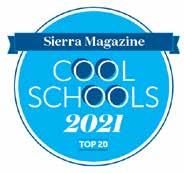
When the CEJS started in 2013, Seattle University was ranked 109th. In 2018, CEJS ranked 8th and in 2021 ranked 14th, which was the last year of the rankings.
In 2021, SU placed 9th for waste diversion among 200+ universities throughout North America and ranked 1st in the diversion category among medium-sized universities

CONSECUTIVE GOLD RATINGS 3
SU has received three consecutive Gold ratings in AASHE’s (the Association for the Advancement of Sustainability in Higher Education) STARS program.
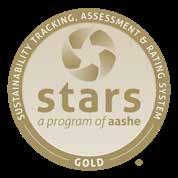
Ranked #16
SU ranked #16 out of 416 schools in Princeton Review’s
2021 Green Honor Roll
In 2019, SU was recognized by the City of Seattle for its commitment to conserving resources and protecting the environment.
SU has received Tree Campus USA status from the Arbor Day Foundation for promoting healthy trees while engaging students and staff in the spirit of conservation.
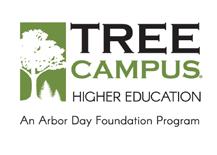

Since 2013, more than 70 Seattle University students with aspirations for sustainability-related careers have worked as interns at CEJS. Students have gained firsthand experience developing web content, conducting greenhouse gas inventories, managing social media pages, planning events and gathering data for SU’s STARS report, which is an Environmental, Social, Governance (ESG) report for universities.
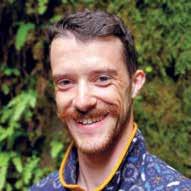
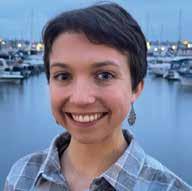
My internship with CEJS was an invaluable opportunity that expanded my view on what environmental justice is and taught me how to work collaboratively to implement efforts under a shared goal. Under the mentorship of the incredible staff at the center, I was able to explore the work of nonprofits and other colleges in the Northwest and implement lessons learned into the climate efforts at Seattle U. Through reviewing the work of fellowship recipients and assisting in running on-campus guest speaker events, I was exposed to how climate change disproportionately impacts underrepresented communities. My internship instilled in me the knowledge that everyone can help further environmental justice efforts. I now serve on a nationwide Equity and Environmental Justice (EEJ) working group where I collaborate with other representatives from National Fishery Management Councils and we share approaches different regions are taking to meet EEJ objectives and further efforts in place.
I was a CEJS intern and worked on CEJS projects throughout my entire undergraduate career at Seattle U. I owe so much of my professional and lifestyle passion to my time with the Center. CEJS helped me coalesce my professional goals to incorporate sustainability and resilience into everything I’m a part of. My time at Seattle U also helped me find a calling to work on reinventing our built environment. After graduating, I did a M.S. in Civil Engineering with a focus on energy systems and climate science at the University of California, Berkeley. In my current role as an Electric Transmission Line Project Manager at Pacific Gas and Electric, I execute a portfolio of underground and overhead transmission line capital projects and provide interconnection services for solar and wind developers. Whenever I’m engulfed in data analysis or sustainability reporting, I think back to the valuable time I spent at CEJS. I would do it all again in a heartbeat!
Jean-Paul Wallis, ’18 (BS Civil Engineering) Electric Transmission Line Project Manager, Pacific Gas and Electric Angela Forristall, ’17 (Marine and Conservation Biology) Member, National Equity and Environmental Justice (EEJ) working group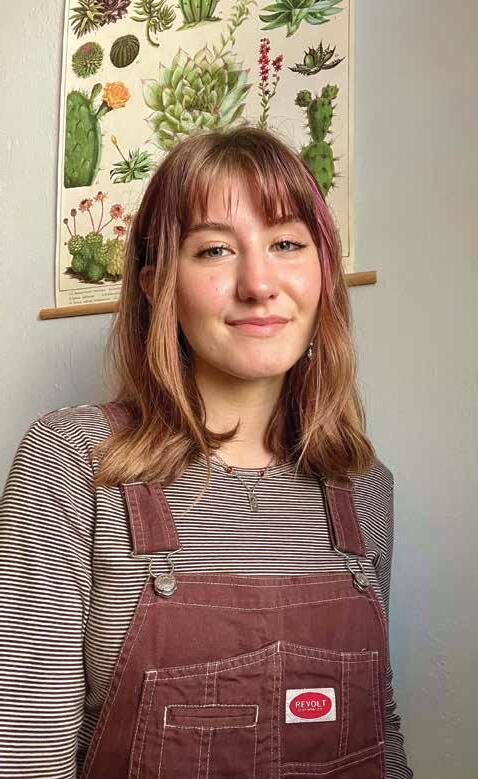
Each year, students from SU’s Digital Design program work with CEJS to produce original artwork for campus signage, events and promotional materials. Digital design student Vitoria Cassol helped CEJS create several infographics that highlight the amazing sustainability work that is done through our campus operations. Her designs were featured during a men’s basketball game on the Jumbotron at Climate Pledge Arena.


 Examples of infographics from a set of 30 slides done by Vitoria Cassol.
Examples of infographics from a set of 30 slides done by Vitoria Cassol.
With the generous help from CEJS donors, we have been able to offer two annual research fellowships for students. The first is the Gary L. Chamberlain Fellowship, which honors the legacy of Professor Gary Chamberlain, whose work explored the intersection of theology and water justice. Students may also apply for the Francis Fellowship, which honors both St. Francis of Assisi, the patron saint of animals and the environment, and Pope Francis who authored his encyclical on the environment, Laudato Si’.
The CEJS fellowships have also provided faculty the time and seed money they need to move their research forward. The CEJS Faculty Fellows publish books and journal articles as well as receive external grants based on their fellowship work. New Laudato Si’ faculty fellowships are being developed over the next year.
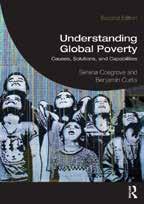

 Henry Louie, PhD Professor Electrical and Computer Engineering
Henry Louie, PhD Professor Electrical and Computer Engineering

My work is in the area of energy access and the attendant concerns of energy equity and energy justice. More specifically, I focus on solar-powered off-grid electricity access to homes and communities where the power grid has yet to—and may never—reach. Much of my work has considered communities in Sub-Saharan Africa, where more than 500 million people do not have access to electricity. More recently, I have been working on energy access issues on Tribal Lands in North America.
As a CEJS Fellow, I developed data-driven statistical and time-series models of energy consumption of electric vehicles. In my present work I use these same data analysis techniques, but to model electricity consumption of off-grid homes on the Navajo Nation. This helps us understand how to better design off-grid systems, ensuring the batteries and solar panels are appropriately sized for the homes.
By Serena Cosgrove and Benjamin CurtisThe fellowship from CEJS helped so much to finish up our textbook on global poverty, particularly the chapter on the environment. I also use the book in classes that I regularly teach.
I’m immensely grateful to CEJS for their support.
Serena Cosgrove, PhD Associate Professor, International Studies Director, Latin American Studies Faculty Coordinator, Central America Initiative
I was awarded the CEJS faculty fellowship in AY 2016-17 for a proposal titled ‘Remote Environmental Monitoring using Internet of Things (IoT).’ At the time, I was just beginning to explore various applications of IoT technology and the possibility of monitoring environmental parameters remotely and in real time, was intriguing. The fellowship was instrumental in solidifying my interest in this area of research and has served as a catalyst for several related accomplishments.
Results from this work were presented at the 2016 NCUR conference (by a student researcher) and published and presented at the 2017 IEEE Global and Humanitarian Technology Conference (GHTC).

This worked paved the way for a collaboration with Seattle University’s chapter for Engineers for a Sustainable World (ESW). I worked with undergraduate students to design an IoT-based water-quality sensor system that was successfully deployed at the aquaponic facilities in Instituto Superior Tecnológico Trentino Juan Pablo II, Manchay, Peru in March 2017; Zion Children’s home near Chiang Mai, Thailand in July 2017; and Washington Middle School and Rotary Boys and Girls Club in Seattle in June 2017.
My work on remote environmental monitoring laid the groundwork for a $250,000 grant from the W. M. Keck Foundation’s Undergraduate Education Program in January 2017. This grant supported the integration of IoT technology within the undergraduate ECE curriculum.
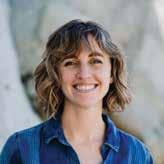
More recently, my research team designed a remote sensing system for groundwater monitoring in Morocco. The system is being deployed at a landfill in Berrechid for continuous monitoring of indicators related to emerging contaminants in groundwater.

One of the many reasons I chose to continue my education at Seattle University is because of their commitment to sustainability. The CEJS gave me an opportunity, as a fellow, to be involved before I even moved to Seattle. CEJS, my research advisor and fellow students have provided me with opportunities to grow as a climate justice advocate and remind me daily that institutional efforts can make positive changes. Additionally, this research opportunity benefited my law school endeavors as it allowed me to grow in my writing and public speaking.
I was awarded a CEJS fellowship to work with Dr. Agnieszka Miguel and the Panthera big cat conservancy on a computer vision system, which could be used to increase monitoring and understanding of elusive and endangered snow leopards. Through this research project I fell in love with the technical rigor and creativity of computer vision research and saw the outsize potential for environment impact that this type of research could have. I’m currently starting a position as an assistant professor of AI and Decision Making at MIT. The early support from CEJS laid the groundwork for my academic career, and I’m soexcited to see what the next 10 years of this program will bring.
Donna Shahbaz, JD Candidate, ’24 Health Law Society | President Environmental Law Society | Vice President Student Bar Association | Secretary Shiny Abraham, PhD Associate Professor Electrical and Computer Engineering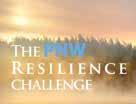


When CEJS started in 2013, one of the goals was to be a convener for regional and international conversations on environmental justice and sustainability. Since then, many conferences and events have drawn thousands of attendees. Many conferences hosted resulted in new scholarly works.
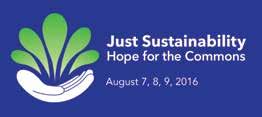
In 2020, CEJS had to pivot to a purely online conference format and Earth Talks was born. The inaugural Earth Talks was highlighted in USA Today and the event kicked-off with Denis Hayes, who founded Earth Day 50 years earlier. Earth Talks is now CEJS’s annual signature event showcasing the environmental justice and sustainability work by SU students, staff, faculty and community partners.

In 2014 and 2016, CEJS hosted Just Sustainability conferences for attendees from all over the world. Both conferences led to special issues of the journal, Interdisciplinary Environmental Review. Then in 2018, CEJS partnered with the Albers School of Business and Economics to host the Innovation for Sustainability Conference for the International Association of Jesuit Business Schools and the Colleagues in Jesuit Business Education. This resulted in a special issue of the Journal of Management for Global Sustainability. CEJS also hosted the 2018 Pacific Northwest Climate Resilience Summit and the 2018 Food Tank Summit.


In her role as Campus Sustainability Manager, Yolanda Cieters is well-recognized around campus because she interacts with so many different departments to gather information for the STARS report. “If Yolanda is knocking on your door, you probably owe her some data,” says CEJS Director Phillip Thompson. “She is an amazingly hard working and dedicated employee who does her job with professionalism, grace and humor.” Cieters juggles a vast array of activities that include sustainability reporting and planning; advancing the implementation of sustainability initiatives; organizing events, managing interns, producing web and newsletter content, providing campus sustainability tours and much more. Through this work, she collaborates with staff, faculty and students and with countless external stakeholders. In 2018, Cieters was the recipient of Seattle University’s Lee Thurber Award for staff excellence. As one of her nominators for the award noted, “Yolanda is the most deserving person for this award because of three things: Her work ethic, optimism and genuine care for other people.”
Over the past year, Cieter’s role has expanded to serve as co-chair of the Laudato Si’ Action Platform (LSAP). Through this seven-year effort, she will help the university align sustainability initiatives within academics and campus operations with the LSAP’s priorities, which seek to “develop concrete actions to protect our common home.”

My role involves positive change and supporting our university in contributing to the betterment of our common home. Absolutely central in that work are our students, who I gain so much from. They motivate me every day.
Yolanda Cieters CEJS Campus Sustainability Manager
With the help of our CEJS donors and partners such as Rotary International, Professionals Without Borders and Engineers for a Sustainable World, our students, staff and faculty have contributed to water, sanitation and food justice projects that have improved the lives of more than 16,000 people in Haiti, Nigeria, Peru and Thailand.



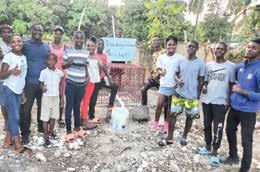

Within days of the devastating earthquake that struck Haiti in January 2010, CEJS Director Phillip Thompson shipped three drinking water treatment systems to Port au Prince for emergency relief. Through these efforts, lasting partnerships serendipitously formed with Haiti Tec, Engineers for a Sustainable World, Plumbers Without Borders, the Andrea Bocelli Foundation and several Rotary Clubs in the Seattle area. The mission of this partnership is to help provide access to safe drinking water for medical clinics and schools throughout Haiti.
Since 2013, CEJS has supported eight safe water projects with its partners in Haiti, including a groundwater well for an orphanage that was founded by Positive Action for Haiti soon after the earthquake. In addition to providing safe drinking water for approximately 20 children and caretakers, the well has been used to water a large garden that has been a critical source of food and additional income during these last several tumultuous years.
Above: Students at St. Philomene School, Haiti, 2018. Below: The new well at the Positive Action for Haiti orphanage in Gonaives, Haiti, 2018. Plumbers Without Borders Ret. Captain Jack McNamee from Plumbers Without Borders and the Haiti Tech team install a water treatment system at Notre Dame du Rosiare in Croix des Bouquets, Haiti 2016.Engineers for a Sustainable World Club

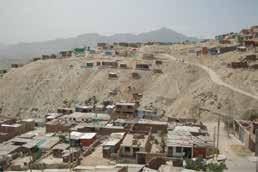
In 2015, Phillip Thompson met with Father Jose Chuquillanqui Yamamoto in Lima, Peru, to discuss access to safe water for the community of Manchay. The discussion quickly moved to the topic of aquaponics, which is a symbiotic system where water from fish tanks is used to provide nutrients to plants. It is also a sustainable process that uses 10 times less water than traditional agriculture, which is an important feature for this coastal desert region that receives less than one inch of rainfall per year. Fr. Chuquillanqui enthusiastically supported the idea for a project where Seattle University students would work with students from a local technical school, Instituto Superior Tecnológico Trentino Juan Pablo II.
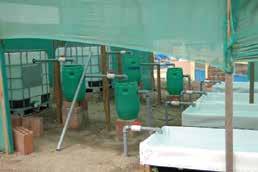
The student teams built a vermicomposting system that upcycled compost to worms that could be used for fish food. They also installed a solar array to power air pumps and sensors for pH, temperature and dissolved oxygen that delivered real-time data to the web. Within two years, the system was able to produce 9,600 heads of lettuce and 400 tilapia per year, resulting in a net value of approximately $4000, for the school. Today, CEJS is helping support the Peruvian team as they seek to build a full-scale aquaponics system in their hometown of Jaén, Peru.
 Left: Students modifying the aquaponics water quality sensors. Lower-left: The first crop of hydroponically grown lettuce at the John Paul II Technical School in Peru.
Top: Migrant housing in Manchay, Peru (30 miles south of Lima).
Left: Students modifying the aquaponics water quality sensors. Lower-left: The first crop of hydroponically grown lettuce at the John Paul II Technical School in Peru.
Top: Migrant housing in Manchay, Peru (30 miles south of Lima).
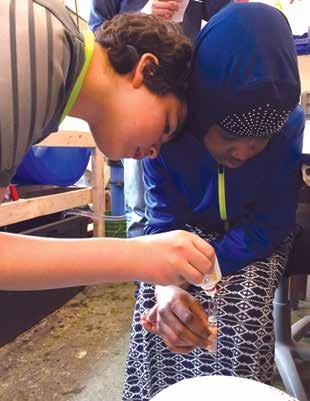


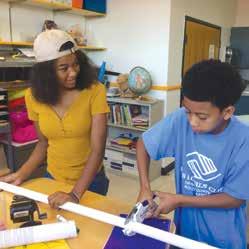
In addition to being a sustainable farming approach, aquaponics is an excellent platform for teaching students about plants, fish, water chemistry, pumps, sensors and programming.
Right: Students program a Raspberry Pi microcontroller for aquaponics water quality sensors. Below: Students assemble piping
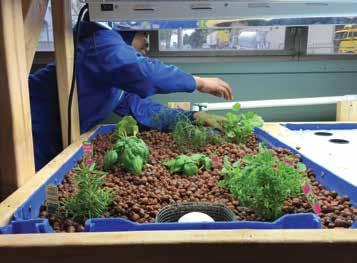 Rotary Boys and Girls Club
for an aquaponics system.
Washington Middle School
Above: Aquaponics system at Washington Middle School.
Left: Students using the ammonia test kit.
Rotary Boys and Girls Club
for an aquaponics system.
Washington Middle School
Above: Aquaponics system at Washington Middle School.
Left: Students using the ammonia test kit.
Academic Assembly
Albers School of Business and Economics
Association for the Advancement of Sustainability in Higher Education
Bailey Gatzert Elementary School
Bullitt Foundation, Capitol Hill EcoDistrict
Center for Community Engagement
Center for Ecumenical and Interreligious Engagement
Center for Social Transformation and Leadership
Controller’s Office
Earth Ministry
Emerald City Rotary Club
Engineers for a Sustainable World
Environmental Health and Safety Office
Faith International
Food Tank
Instituto Superior Tecnológico
Trentino Juan Pablo II
Kilowatts for Humanity
Laudato Si’ Action Platform Committee

Lemieux Library and McGoldrick
Learning Commons
Loyola University of Chicago
Low Income Housing Institute
Managed Print Services
MotMot Coffee
Nicamigos
Plumbers Without Borders
Positive Action for Haiti
President’s Committee for Sustainability
Professionals Without Borders
Redhawk Dining
Residence Hall Association
Rotary Boys and Girls Club
Rotary District 5030
Rotary Club of Federal Way
Rotary Club of Lynnwood
Rotary Club of Seattle
Seattle Academy of Arts and Sciences
Seattle Journal of Environmental Law
St. James Cathedral
SU Athletics
SU Department of Civil and Environmental Engineering
SU Department of Mechanical Engineering
SU Department of Transportation and Parking Services
SU Endowed Mission Fund
SU Environmental Studies Department
SU Facilities Services
SU Grounds
SU Housing and Residence Life
SU Human Resources
SU Indigenous Peoples Institute
SU Innovation and Entrepreneurship Center
SU Institute for Catholic Thought and Culture
SU Institutional Research
SU Jesuit Community
SU Marketing Communications
SU Office of Diversity and Inclusion
SU Office of Institutional Equity
SU Office of Multicultural Affairs
SU Outreach Center
SU President’s Office
SU Procurement Office
SU Rotaract Club
SU Staff Council
Sustainable Seattle
Sustainable Student Action
The Northwest School
Undergraduate Admissions
United States Environmental Protection Agency Region 10
University of New Hampshire
University of Washington Integrated Design Lab
Washington Oregon Cascadia Higher Education Sustainability Conference
Washington Higher Education Sustainability Coalition
Washington Middle School
Western Washington University
World Relief
Yes! Magazine
Rotaract and Engineers for a Sustainable World Club
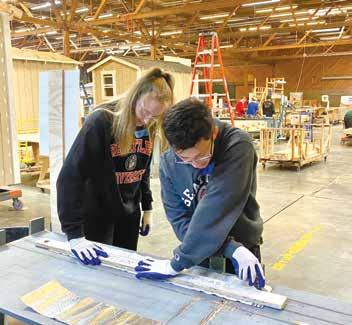
Shiny Abraham
Agnes V. Decena, DMD Dental Corporation
American Financial Services Association
American Water Works Association: King County Subsection
Richard N. Anderson
Robert J. Andolina
Josephine A. Archibald
John Armstrong
Ngoc K. Armstrong
Eric C. Bahuaud
Keith G. Baldwin
Christina L. Barrese
Karen Barta
Carol A. Bement
Robin Beukers
Stephanie Birdsall
Olivia S. Blasi
Sean Blechschmidt
John Borghesi
Gabriel Boynay
Kristin R. Brethova
Guadalupe Briseno
Shannon K. Britton
Jeffery A. Brown
Jeannette M. Buehler
Heather Burpee
Ryan Burton
Caroline A. Cabeza
Katherine A. Camacho Carr
Leticia Camacho
Amber H. Campbell
Richard J. Caragol
Kathryn C. Carey
Joel Carlson
Delaney Carr
Michael R. Carr
John D. Carter
Sharon A. Chamberlain
Mary Chapman
Ronald Chapman
John P. Chattin-McNichols
Margaret Chon
Luc Cieters
Yolanda Cieters
Howard J. Cohen
Nathaniel H. Conroy
Kristin N. Covey
Janet T. Cowal
Vincent T. Cowal
Karen D. Cowgill
Julie A. Crowe
Ronald Dailey
Edward J. DeBroeck
Sidney W. Delong
Martha DiLullo
Jessica Dirks
Robert J. Dullea
Harry Dursch
Geraldine K. Dykeman
James J. Dykeman
Emerald City Rotary
Therry Rose Eparwa
Ara Erickson
F-I Granite-Marble Inc.
Fidelity Charitable Gift Fund
Claire Fielder
Fine Stone, Inc.
Tamara L. Fitzpatrick
Stacey J. Fullwiler
John J. Gardiner
Kimberly S. Gawlik
Jacqueline N. Gehlen
Meletios Geokezas
Theodora Geokezas
Bryce Giron Mathern
Gareth P. Green
Georgia G. Gurrieri
Ashley N. Hagar
John H. Hainze
Rizwan Hamid
Jessica L. Harris Herrera
David J. Hartley
Rebecca S. Hartley
Colleen Hatfield
Denis A. Hayes
Brad R. Helland
Dylan W. Helliwell
Anne M. Hirsch
Stephen M. Hirsch
Luther C. and Marion E. Hitchcock
Theresa M. Honan
Wesley J. Howard-Brook
Le X. Hy
Calvin N. Ihler
Sonja A. Ihler
Jenna L. Isakson
Charles F. Jackels
Susan C. Jackels
Cynthia James
Patten P. Jazmine
Mark Jordan
Patrick Kabealo
H B Kahn
Yosef C. Kalinko
Donna Kam
Philip Kam
Madeline J. Kass
Kennedy/Jenks Consultants, Inc.
Arlene Kennelly
Elsa P. Keown Borgen
Thomas D. Keown
Nancy Kessler
Paige S. Khoury
Paulette and Paul Kidder
Victoria L. Kill
Emmett S. Killebrew
Susan L. Killen
Larry Kinner
Lori R. Klumb
Denise D. Knapp
Beth Knox
Christopher T. Koruga
Kent W. Koth
Burak Kutlu
Carl J. Lambe
Julie B. Larson-Green
John W. Lauer
Charles F. Lawrence
Quan V. Le
Mark Leahy
Richard J. LeBlanc
Lily Lee
Valerie A. Lesniak
Kan Liang
Lightshine
David J. Lillethun
Jonathan S. Lindgren
Henry M. Louie
Richard T. Luoma
Carol Mabbott
David E. Macek
Gregory M. Magnan
Jane E. Magnan
Rubina Mahsud
Michael D. Marsolek
Shane P. Martin
Scott K. McClellan
McDermott Costa
Henry W. McGee
Kathleen A. McGill
John T. McLean
Marc C. McLeod
John McNamee
Margaret Melun
Elena V. Menagarishvili
Nancy M. Milan
Gordon L. Miller
Jacquelyn C. Miller
Janet E. Mills
Elizabeth Mitchell
Daniel J. Moresi
Darnel M. Moresi
Gregory E. Moy
Rose M. Murphy
Newport Presbyterian Church
Paige Novak
John W. O’Connor Lenth
Moira A. O’Connor Lenth
Kevin O’Leary
Carla K. Orlando
Joseph A. Orlando
Megan M. Otis
Constance R. Owens
Pace Engineers, Inc.
Barbara B. Parker
Amy L. Patton
Brian W. Patton
Jessica D. Peaslee
Joel Petersen
Dean J. Peterson
Joseph M. Phillips
Theresa D. Pimentel
Michaela N. Plumage
Sonja M. Ponath
William G. Poole
Charles Pratt
Marilyn S. Price
Thomas H. Price
Luis F. Quintero
Nicole C. Raeburn
Bret C. Ranoa
Ruby P. Ranoa
Susan Ranoa
Madhu T. Rao
Terence S. Read
RH2 Engineering, Inc.
Daniel R. Richings
M. Victoria Ries
Annemarie Riese
Clare K. Riley
Leanne D. Robertson
Jeanie M. Robinson
Mary Robinson
Thomas F. Robinson
Jeanette Rodriguez
Gerald T. Roling
Hannah M. Rolston
Natalie Rosenthal
Rotary Club of Emerald City Foundation
Rosanne Royer
Marie-Paule Rubens
Meg E. Ruby
Jennifer L. Salemann
Miriam S. Samuel
Gabriel D. Saucedo
Schwab Charitable Fund
Seattle University
Mary E. Sebek
Joslyn Semichy
Lorri J. Sheffer
Aerica D. Shimizu Banks
Brandon J. Shuman
Teodora R. Shuman
Jhon P. Smith
Snappy App, Inc.
Frank J. So
Megan E. Spaulding
Lance Stevens
Christopher D. Stoll
Glenn C. Strid
Wei Su
Kristen M. Swanson
Ethan J. Talbott
John C. Teegarden
Mary Margaret Thomas
Ky Thompson
Phillip L. Thompson
Sompit Thompson
Jennifer Tilghman-Havens
Matthew J. Tilghman-Havens
David P. Tom
Hannah Tracy
Galen Trail
Ian J. Tromble
Roger Tucker
Nathaniel F. Uttaro
Lailan Uy
Brianne L. Vanderlinden
Michele R. Vasquez
Nicolette R. Verhoff
Kerry S. Von Esch
Briana M. Walker
Jean-Paul R. Wallis
Betsy L. Watkins
Eric J. Watson
William L. Weis
Weyerhaeuser Company
Julie M. White
David K. Whitman
Rachelle A. Whitman
Patricia M. Whitney
Kevin Wilhelm
Abrianna T. Wright
Theresa H. Yeh
Dan R. Young